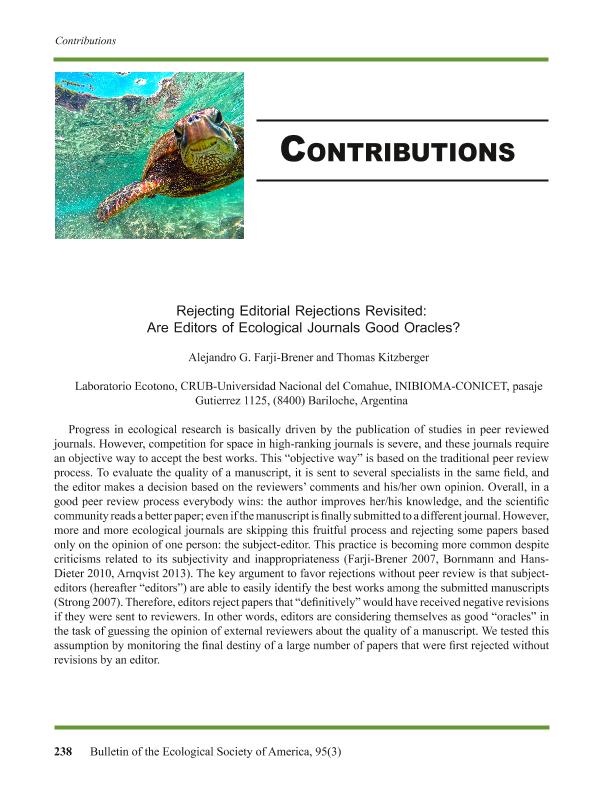Mostrar el registro sencillo del ítem
dc.contributor.author
Farji Brener, Alejandro Gustavo

dc.contributor.author
Kitzberger, Thomas

dc.date.available
2017-01-19T20:22:10Z
dc.date.issued
2014-07
dc.identifier.citation
Farji Brener, Alejandro Gustavo; Kitzberger, Thomas; Rejecting Editorial Rejections Revisited: Are Editors of Ecological Journals Good Oracles?; Wiley; Bulletin Ecological Society Of America; 65; 3; 7-2014; 238–242
dc.identifier.issn
0012-9623
dc.identifier.uri
http://hdl.handle.net/11336/11653
dc.description.abstract
Progress in ecological research is basically driven by the publication of studies in peer reviewed journals. However, competition for space in high-ranking journals is severe, and these journals require an objective way to accept the best works. This “objective way” is based on the traditional peer review process. To evaluate the quality of a manuscript, it is sent to several specialists in the same field, and the editor makes a decision based on the reviewers' comments and his/her own opinion. Overall, in a good peer review process everybody wins: the author improves her/his knowledge, and the scientific community reads a better paper; even if the manuscript is finally submitted to a different journal. However, more and more ecological journals are skipping this fruitful process and rejecting some papers based only on the opinion of one person: the subject-editor. This practice is becoming more common despite criticisms related to its subjectivity and inappropriateness (Farji-Brener 2007, Bornmann and Hans-Dieter 2010, Arnqvist 2013). The key argument to favor rejections without peer review is that subject-editors (hereafter “editors”) are able to easily identify the best works among the submitted manuscripts (Strong 2007). Therefore, editors reject papers that “definitively” would have received negative revisions if they were sent to reviewers. In other words, editors are considering themselves as good “oracles” in the task of guessing the opinion of external reviewers about the quality of a manuscript. We tested this assumption by monitoring the final destiny of a large number of papers that were first rejected without revisions by an editor.
dc.format
application/pdf
dc.language.iso
eng
dc.publisher
Wiley

dc.rights
info:eu-repo/semantics/openAccess
dc.rights.uri
https://creativecommons.org/licenses/by-nc-sa/2.5/ar/
dc.subject
Academic
dc.subject
Peer Review
dc.subject.classification
Ecología

dc.subject.classification
Ciencias Biológicas

dc.subject.classification
CIENCIAS NATURALES Y EXACTAS

dc.title
Rejecting Editorial Rejections Revisited: Are Editors of Ecological Journals Good Oracles?
dc.type
info:eu-repo/semantics/article
dc.type
info:ar-repo/semantics/artículo
dc.type
info:eu-repo/semantics/publishedVersion
dc.date.updated
2016-12-12T14:20:26Z
dc.journal.volume
65
dc.journal.number
3
dc.journal.pagination
238–242
dc.journal.pais
Estados Unidos

dc.journal.ciudad
Nueva York
dc.description.fil
Fil: Farji Brener, Alejandro Gustavo. Consejo Nacional de Investigaciones Científicas y Técnicas. Centro Científico Tecnológico Patagonia Norte. Instituto de Investigación en Biodiversidad y Medioambiente; Argentina. Universidad Nacional del Comahue; Argentina
dc.description.fil
Fil: Kitzberger, Thomas. Consejo Nacional de Investigaciones Científicas y Técnicas. Centro Científico Tecnológico Patagonia Norte. Instituto de Investigación en Biodiversidad y Medioambiente; Argentina. Universidad Nacional del Comahue; Argentina
dc.journal.title
Bulletin Ecological Society Of America

dc.relation.alternativeid
info:eu-repo/semantics/altIdentifier/url/http://onlinelibrary.wiley.com/doi/10.1890/0012-9623-95.3.238/full
dc.relation.alternativeid
info:eu-repo/semantics/altIdentifier/doi/http://dx.doi.org/10.1890/0012-9623-95.3.238
Archivos asociados
